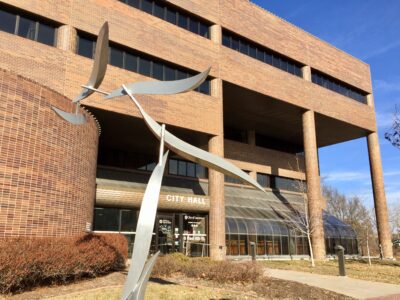With 108 Airbnbs and other short-term rentals now licensed, Lawrence code enforcement thinks process to ID unlicensed rentals is working

photo by: AirDNA
A map from the market monitoring site AirDNA shows the short-term rentals in Lawrence. The purple dots are whole-home rentals while the blue are private room rentals.
With more than 100 short-term rentals now licensed in Lawrence, city code enforcement believes its tactics are working for identifying people renting properties by the night without the required license.
After falling amid the COVID-19 pandemic, the number of short-term rental listings in Lawrence is on the rise again, with a little more than 150 properties listed on the popular site Airbnb. Code Enforcement Manager Brian Jimenez said there are currently 108 licensed properties in Lawrence, and because his office has found several properties listed more than once, he believes the city does not have many unlicensed rentals. He said he thinks the reviews conducted by code enforcement staff are catching those who try to operate without a license.
“I think we have been very diligent in identifying them,” Jimenez said. “They are sometimes hard to identify based on advertisements, but we have tools that we use.”
Jimenez, who did not want to disclose exactly how the city identifies the rentals, said listings are added and taken offline on a regular basis, and the code enforcement office does a monthly review that results in anywhere from three to five notices being sent to operators who list a property without having a license. He said operators have 30 days to come into compliance before they are subject to fines. Ahead of the annual renewal process, Jimenez said the code enforcement office last week sent out 110 renewal letters to short-term rental operators.
In the fall of 2020, the Lawrence City Commission prohibited Airbnbs and other short-term rentals in single-family residential areas unless the operator also lives in the home or a property on the same lot, such as a duplex or home with a carriage house or other accessory dwelling unit. The regulations only allow non-owner-occupied short-term rentals in residential areas zoned as multi-family and several nonresidential zoning districts. In addition, short-term rental operators can only operate a maximum of three rentals at one time. Those who operate such rentals illegally are subject to a fine of up to $2,500.
However, for would-be guests, it is difficult to know which short-term rentals are following the city’s regulations. The majority of the rentals currently listed on Airbnb do not display their city license as required by city regulations. Jimenez said the city would be communicating with operators about that requirement as part of the ongoing renewal process for the upcoming year.
“That’s one of those areas where we need to get more compliance,” he said.
In the face of the city’s affordable housing shortage, one of the key reasons city leaders cited for the short-term rental limitations was to try to stop too many homes from being taken off the market and essentially used as a commercial income-generating property instead of housing. They noted that the vast majority of the short-term rentals are east of Iowa Street in the city’s core neighborhoods, potentially taking away from possible affordable housing options.
Maps of current short-term rentals show that continues to be the case, with large concentrations of short-term rentals located in the East Lawrence, Oread, Barker and other neighborhoods near downtown Lawrence and the University of Kansas, according to the market monitoring site AirDNA. The vast majority of the listings are east of Iowa Street, with about 55% of the listings located in the 66044 area code.
City leaders will soon be revisiting the regulations for short-term rentals at the request of Vice Mayor Lisa Larsen. Larsen said out of a continued interest in protecting the residential areas, she wanted to hear from city staff regarding whether it was legally possible to lift the three-rental cap for only the nonresidential zoning districts, and if so, whether commissioners have interest in doing so. Those districts include various commercial and industrial areas of the city. A date for that discussion has not yet been scheduled.
“I just want to hear what this commission says about it,” said Larsen, who is one of only two commissioners remaining on the governing body — Commissioner Brad Finkeldei being the other — who were involved in creating the regulations.







COMMENTS